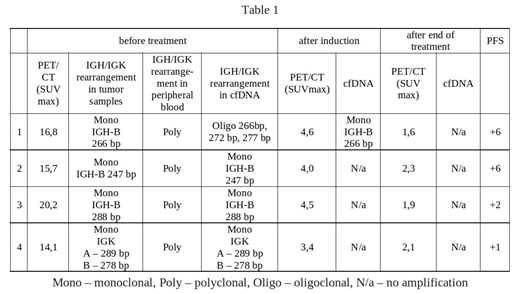Background. Response to the induction chemotherapy is an important predictor of favorable outcome in aggressive lymphomas. As it was shown recently (Kurtz et al.2018) combination of interim PET/CT (iPET/CT) negativity and early molecular response detected by cell-free DNA (cfDNA) analysis, robustly stratify EFS and OS in patients (pts) with diffuse large B-cell lymphoma. There is no consensus on the most optimal program for primary mediastinal lymphoma (PML) treatment. Both R-CHOP+\-RT and R-DA-EPOCH are highly effective frontline options for PML, but about 10-15% of pts develop relapse/progression mainly within 2 years from diagnosis. We hypothesize that intensification of induction with 2 courses of modified R-NHL-BFM-90 program (R-m-NHL-BFM-90), followed by 4 courses of R-EPOCH without dose escalation might improve treatment outcome in PML.
Aim. To assess the efficacy of R-m-NHL-BFM-90/R-EPOCH regimen for untreated PML pts by means of PET/CT and cfDNA evaluation.
Methods. Overall, 18 pts were enrolled in prospective study between 2015 and 2019 years; median age 34 (19-50); M/F=4/14; Ann Arbor stage >I in 18 (100%); adverse factors in 12 pts (bulky disease>10 cm in 11 pts, involvement of the soft tissues in 9 pts and breast in 4 pts, pleural effusion in 6 pts, elevated lactate dehydrogenase level in 10 pts). The treatment plan consisted of: (i) induction of remission (blocks A and B of R-mNHL-BFM-90 program); (ii) consolidation with 4 courses of R-EPOCH. PET/CT was performed in all pts before therapy, after 2 courses of induction and after the end of therapy. B-cell clonality was assessed detecting immunoglobulin heavy chain gene rearrangements IGH (VH-JH FR2) and immunoglobulin light kappa chain gene rearrangement (IGK), by the use of multiplex Biomed-2 primer system for PCR and Gene-Scan analysis. cfDNA was obtained before the start of the treatment, after the induction and after the end of therapy in 4 pts. DNA concentration was measured by real time PCR with beta-globin primers.
Results. All 18 pts completed induction phase. After 2 courses of R-mNHL-BFM-90 PET/CT Deauville score (DS) were DS1-3 in 9 pts (50%) and DS4 in 9 pts (50%). 16 pts completed treatment; from these 12 pts received all 4 courses of R-EPOCH. 2 pts received 2 courses and 2 pts only 1 course due to hematologic toxicity grade 3-4 and infectious complications. After the end of therapy PET/CT were DS1-3 in 15 out of 16 (94%) pts. Only 1 patient response was assessed as DS4; after she received autologous HSCT PET/CT negativity was achieved. cfDNA assessment at all stages of treatment was available in 4 patients (Table 1). In all cases before treatment there were no clonal rearrangements in blood samples. Clonal rearrangements in cfDNA before treatment and in tumor samples were the same in all cases. After induction treatment in one case B-cell clonality persisted in cfDNA, but after the end of the treatment there was no amplification of cfDNA from all pts. Overall, with a median follow-up of 14 months (range 1-40) 16/16 pts (100%) are alive in complete remission. Of note, all 4 pts who received only 1-2 courses of R-EPOCH are in complete remission for 4, 13, 16 and 17 months.
Conclusions. Our results suggest that R-m-NHL-BFM-90/R-EPOCH protocol is highly effective for treatment of patients with PML. Given our results, we consider the possibility of reducing the number of cycles of chemotherapy. We suggest that detection of the tumor markers in cfDNA could be used as a biomarker to adapt treatment strategies in the future.
No relevant conflicts of interest to declare.
Author notes
Asterisk with author names denotes non-ASH members.


This feature is available to Subscribers Only
Sign In or Create an Account Close Modal